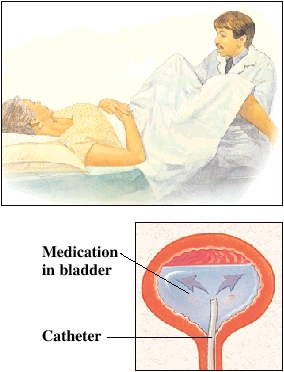Treating Bladder Cancer: Intravesical Therapy
Risks and Possible Complications
-
Bladder infection
-
Bladder irritation (burning, need to urinate frequently, pain on urination)
-
Changes in your blood cell counts (with certain chemotherapy drugs)
-
Scarring of the bladder (rare)
-
General infection (with BCG) (very rare)
Certain types of bladder tumors are hard to remove using surgical procedures like transurethral resection (TUR). These include tumors that are high grade, occur in more than one area, are flat against the bladder wall, or come back after treatment. In these cases, special medications that destroy cancer cells may be placed into the bladder. This treatment is called intravesical therapy. Intravesical therapy may be an option if you have a hard-to-remove tumor. It may also be done after TUR to help keep the cancer from coming back.

Medication Inside Your Bladder
Intravesical therapy is usually done in the doctor's office. A catheter (flexible tube) is used to fill the bladder with liquid medication. This medication may be a liquid chemotherapy drug, which kills cancer cells, or BCG (a type of bacterium), which helps boost your body's immune system.
During Treatment
You're asked to hold the medication in your bladder for up to 2 hours, then urinate. If BCG is used, your doctor may advise you to pour bleach into your toilet after you urinate. This kills any leftover bacteria. Intravesical therapy is usually given weekly for 6-8 weeks. Depending on the medication used, you may be prescribed antibiotics to help prevent infection. If you have a fever at any time during treatment with BCG, call your doctor right away.
After Treatment
After your weekly treatments, you may be given regular follow-up treatments for up to a year or more. These follow-up treatments help keep the cancer from coming back. After the treatments are over, cystoscopy and urine cytology may be done every 3 months or so to help check for cancer cells.












